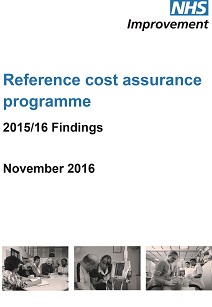News / Reference costs criticised again as Costing Transformation Programme accelerated
An audit of the 2014/15 reference costs has assessed 49% of audited trusts as non-compliant with costing guidance, NHS Improvement has revealed. 
The audit, undertaken this year by PwC, compounds a similarly poor assessment for the 2013/14 costs, which found that 49% of audited trusts had submitted materially inaccurate reference cost returns. All acute trusts have now been audited over the two years.
Data quality was a key cause of non-compliance (see box) but there were specific errors in the initial cost and activity data, in misallocation of cost pools and the use of cost apportionments that did not accurately reflect resource consumption.
A report from NHS Improvement said the oversight body was concerned by the findings, especially given the importance of accurate cost information in addressing current financial challenges – a point underlined by the Carter report on productivity.
‘Our findings show that many trusts still treat costing as a standalone regulatory exercise and do not use costing information to make management decisions. As a result, not enough resources are devoted to ensuring that the information is accurate,’ it said.
Eleven trusts out of the sample of 79 had no significant areas for improvement and the oversight body said other providers could learn from these trusts.
NHS Improvement – which is taking over responsibility for reference costs from the Department of Health – is leading a programme to transform costing. This will replace current healthcare resource group-level reference cost submissions with more detailed patient-level cost submissions, prepared using mandatory, detailed costing standards.
Speaking to Healthcare Finance, NHS Improvement costing director Richard Ford said the reference cost results were disappointing, but many of the problems were known issues. ‘It also makes the case and provides greater impetus for the changes we are making,’ he said.
The organisation has just announced a major acceleration to its Costing Transformation Programme (CTP).
In a formal response to the audit findings, the NHS Improvement costing team said work to address the areas of non-compliance in reference costs would now form an important part of the CTP – highlighting actions that could and should be taken to address these areas.
There will also be changes to next year’s audit programme on 2015/16 costs, Mr Ford said, which will move away from the ‘pass/fail’ assessment on the return itself. Instead it will provide an in-year assessment of the quality of the costing process.
Related content
The Institute’s annual costing conference provides the NHS with the latest developments and guidance in NHS costing.
The value masterclass shares examples of organisations and systems that have pursued a value-driven approach and the results they have achieved.